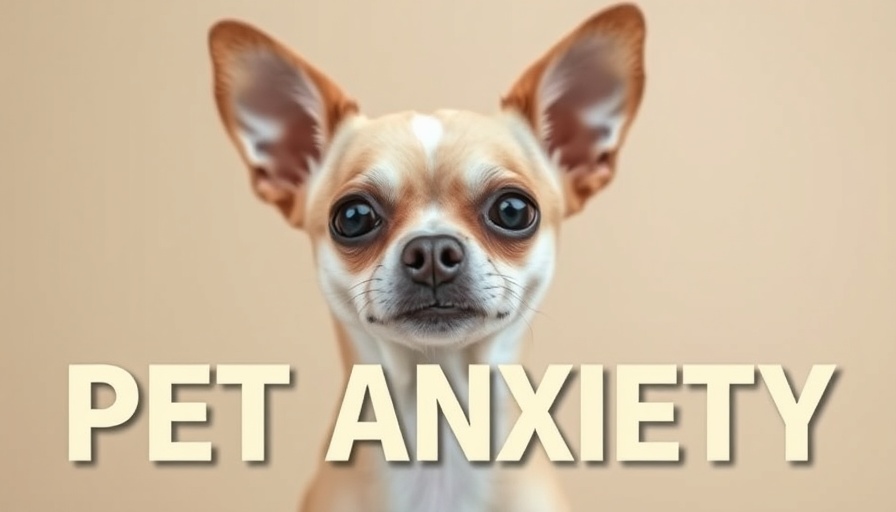
Understanding the Roots of Dog Anxiety
Dog anxiety is a common yet often misunderstood condition. Many owners observe their pets' anxious behaviors—pacing, barking, and destructive chewing—but fail to recognize the underlying issues. One of the most overlooked causes is gut health. Just like humans, dogs experience stress that can impact their physical well-being. When we talk about pet anxiety, it's vital to understand not just the symptoms but also the deeper physiological connections that contribute to a dog's stress response.
The Connection Between Gut Health and Pet Anxiety
Your dog's gut health plays a pivotal role in their emotional state. The gut is often referred to as the second brain due to the significant influence it has on mood and behavior. A balanced gut biome creates conditions for the production of essential brain chemicals such as serotonin, which regulates mood and anxiety. Factors like diet, stress levels, and overall health can disrupt this balance.
For instance, incorporating nutrient-rich foods such as bone broth, kefir, and probiotics can lead to noticeable improvements in your dog's mood. An imbalance may also stem from low levels of magnesium, zinc, and omega-3s—nutrients known for their calming effects. Recognizing the importance of gut health is the first step in addressing anxiety holistically.
Identifying Signs of Anxiety in Your Dog
Each dog exhibits anxiety in unique ways, making it essential for owners to observe their behaviors closely. Signs such as constant barking or whining, restlessness, and even accidents in the house are standard indicators. More subtle signs include hiding or clinginess, especially around stressful events like thunderstorms or changes in routine. Stress manifests not just in obvious behaviors but also through physiological signals, emphasizing the need for a comprehensive approach to your pet's well-being.
Natural Ways to Alleviate Dog Anxiety
Fortunately, there are gentle and effective ways to help your furry friend cope with anxiety. Diet changes are one of the most accessible modifications you can make. Incorporating calming foods and supplements, as well as establishing routines, can create a sense of security for your pet. Natural remedies such as chamomile, valerian root, and even pet-safe CBD oil offer soothing properties without sedation.
Additionally, creating a safe space in your home and rewarding calm behaviors can help your dog feel more secure. Using calming techniques—such as soft music or a quiet corner—can modify your dog's environment in constructive ways, promoting a relaxed state even during stressful events.
A Step-by-Step Approach to Addressing Canine Anxiety
To effectively combat your dog's anxiety, consider adopting a multi-faceted approach. Here are practical steps:
Evaluate Diet: Assess your pet's nutrition. Are they getting enough omega-3 fatty acids? Consider supplements or whole foods high in these nutrients.
Create Routines: Dogs thrive on consistency. Develop a schedule for feeding, walking, and playtime to enhance your pet's sense of stability.
Incorporate Relaxation Techniques: Introduce soothing activities, from gentle massages to quiet time together, fostering a deeper bond with your dog.
Consult with Experts: Speak to your veterinarian about potential nutritional improvements, temperature regulations, or even behavioral therapies that may suit your dog's unique needs.
Emotional Insights: Building Trust and Security
Understanding and addressing your dog's anxiety requires patience and empathy. The bond you share with your pet can be stronger than you realize. Building trust takes time, but rewarding calm behavior and providing mental and physical stimulation can bridge the gap between anxiety and security. Depending on your dog's needs, gradual exposure to their stressors can decrease sensitivity over time, resulting in less anxiety.
Conclusion: The Journey to Calmness
Addressing pet anxiety goes beyond temporary solutions. As loving dog owners, we have a responsibility to identify the causes of their distress and to nurture their emotional well-being. By prioritizing gut health and employing natural remedies, we can help our pets lead happier lives.
Are you ready to explore ways to enhance your dog's well-being? Discover how a few natural diet changes and practices can make a world of difference while creating a lasting bond between you and your beloved pet.
 Add Row
Add Row  Add
Add 




 Add Row
Add Row  Add
Add
Write A Comment